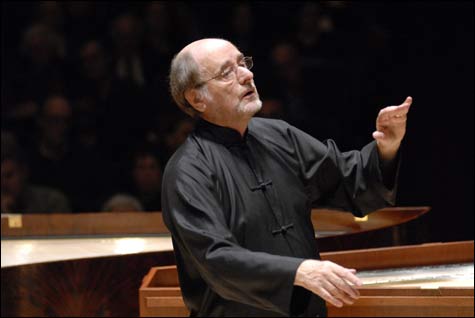
SIR ROGER NORRINGTON: Underlining rather than undermining what’s in the score. |
The year 2007 didn’t begin on the highest note, though I usually look forward to visits from Robert Spano — former assistant conductor of the Boston Symphony Orchestra and now a celebrity in his own right as director of the Atlanta Symphony. His latest BSO program had an astronomy theme. He began with the US premiere of the 47-year-old British composer Mark-Anthony Turnage’s brief but grim end-of-the-world curtain raiser Ceres: Asteroid for Orchestra, which depicts the crashing of that asteroid into the earth. And he ended with a rarer-than-you’d expect rendition of Gustav Holst’s hi-fi extravaganza, The Planets, whose most recent BSO appearance was nine years ago. In between came the more frequently scheduled Violin Concerto by Max Bruch, whose only star was celebrity violinist Joshua Bell. None of these pieces challenged the audience in anything like the way BSO music director James Levine has been doing.Ceres owes a lot (too much?) to Benjamin Britten and the violent Stravinsky of Le sacre du printemps. The final hammering chords (marked “nasty”) are a little obvious. Maybe the two new “asteroids” Turnage has added in the past year make a more compelling suite. The great BSO Bruch performance was by Ida Haendel, in 2002 — mesmerizing, mercurial, moving, by turns teasing and expansive. Bell has become a pose-and-play violinist, taking few risks with his throbbing, undifferentiated texture and generic concentration on the melody.
The Planets, completed in 1916, is the father of movie music: tuneful, atmospheric, it exists to make an orchestra shine — and the BSO shone. The playing was propulsive, full-hearted, and out-of-this-world gorgeous.
The following week, under David Zinman, the BSO served up another musical potpourri. First John Harbison’s delicious Canonical American Songbook (2005), a suite of “canonical” tunes — “Careless Love,” “Aura Lee” (a/k/a “Love Me Tender”), “St. Louis Blues,” “We Shall Overcome,” “Happy Birthday” — in “canonic” polyphony suggesting mediæval, Renaissance, and even Latin-American dances. Then Mozart’s stormy, proto-Beethoven D-minor Piano Concerto, with Radu Lupu. And Rachmaninov’s Symphony No. 3 (1936).
Zinman scaled the orchestra back so as not to overwhelm Lupu’s delicate (some might say precious), pearly playing. He’s one of the few practicing pianists who really cares about beautiful tone, yet his doggy, high-pitched vocalism is about as far as you can get from beautiful tone. The orchestra began in hushed mystery, so the slashing countertheme didn’t need to be huge to sound explosive. I missed Mozart’s grandeur, but the performance certainly wasn’t generic. Zinman is a smart and sensible musician. He captured Harbison’s joky inventiveness (“Happy Birthday” ending with a chorale of wind mouthpieces that sounded like geese playing kazoos) and eerie poignance. But the long Rachmaninov, short on musical ideas, needs someone more eccentric — or more Russian — to hold one’s interest. I glazed over fairly early on.